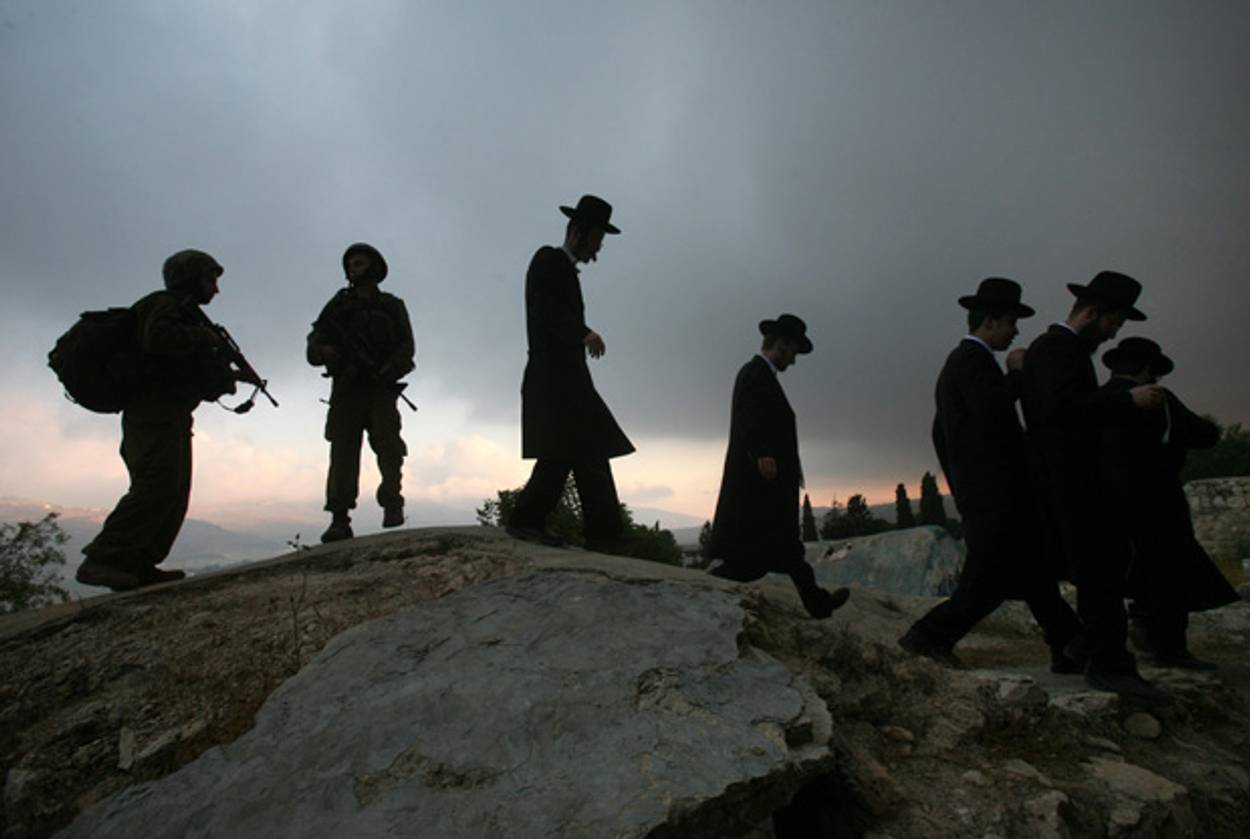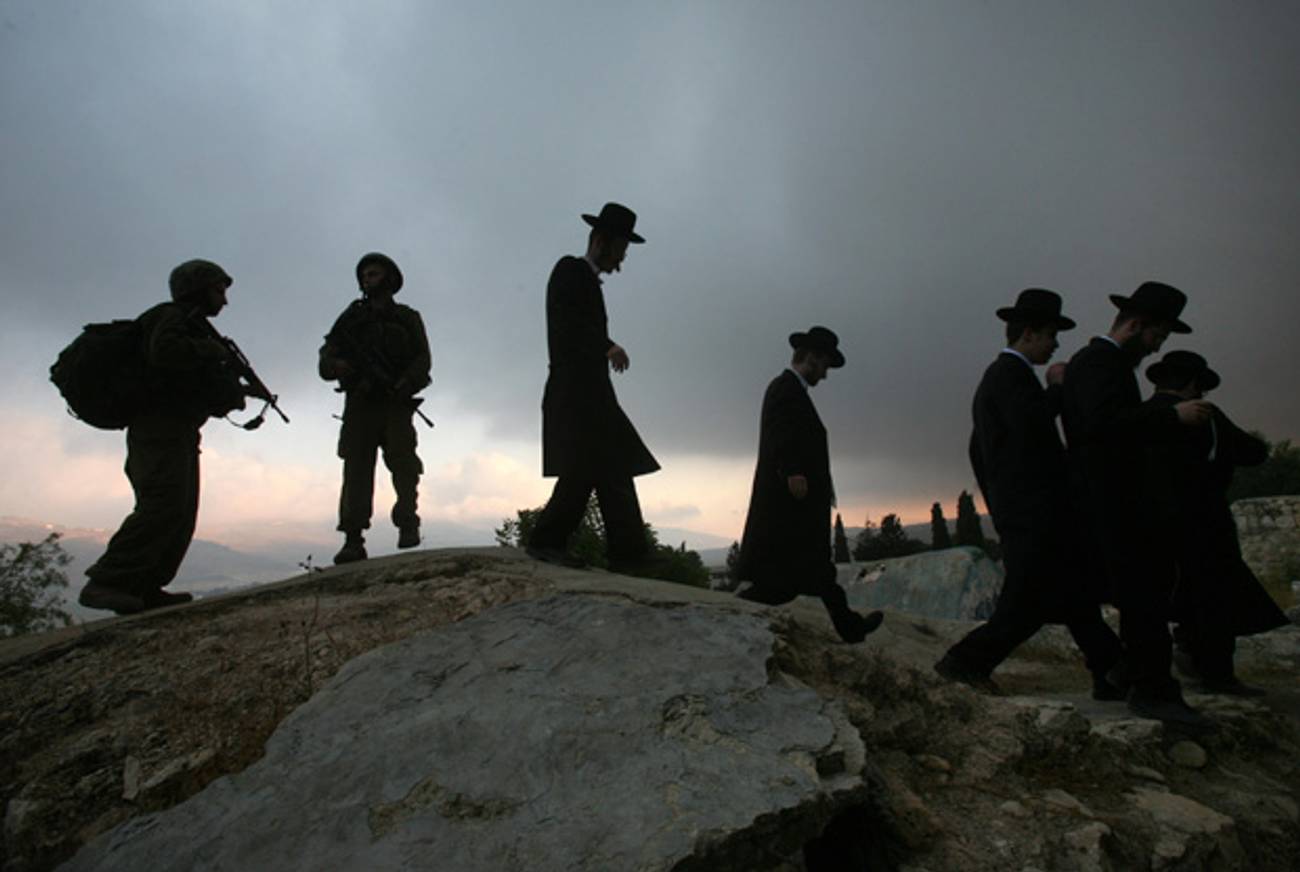Raw Deal
To understand widespread Israeli alienation from the beauty of Jewish tradition, look to Ben-Gurion’s political bargain with the Orthodox




In his book The Imaginary Voyage: With Theodor Herzl in Israel, first published (in French) in 1998, the cosmopolitan Nobel laureate Shimon Peres takes the Viennese visionary on a tour of the modern Jewish state. Along the way, Peres quotes a passage from Der Judenstaat, Herzl’s Zionist blueprint of 1896:
Faith unites us, knowledge gives us freedom. We shall therefore prevent any theocratic tendencies from coming to the fore on the part of our priesthood. We shall keep our priests within the confines of their temples in the same way as we shall keep our professional army within the confines of their barracks.
Suffice it to say, it didn’t quite work out that way, not even from the start. In his new Nextbook Press book, Ben-Gurion: A Political Life, co-written with the veteran Israeli journalist David Landau, Peres describes the deal that Ben-Gurion made with ultra-Orthodox rabbi-politicians at the time of Israel’s founding: kashrut in all public institutions, Shabbat as the day of rest, rabbinic control of marriage and divorce, and the exemption of full-time yeshiva students, who at the time numbered only in the hundreds, from army service. This would all seem a violation of Herzl’s vision, but Peres defends Ben-Gurion’s consensus-building move as wise and pragmatic, “because the number of people in Israel who defined themselves as people of faith was large.” In a dialogue between the co-authors, the president of Israel declares:
Israel is a secular state. The Orthodox have bargaining power, so everything has to be done by compromise. But Israel is not under religious control: It’s not a halachic country, it’s not a theocracy. Ben-Gurion opposed religious coercion and opposed anti-religious coercion.
True, Israel is not a theocracy the way, say, Iran is one. But stop any bareheaded Jew on a Tel Aviv beach and ask them if there’s religious coercion in their country, and the knee-jerk response will be yes. For many Israelis, “religious coercion” doesn’t mean forced synagogue attendance, but the evasion of military duty by tens of thousands of young ultra-Orthodox men; the harassment of Reform rabbis and citizens who drive on Shabbat; the overflowing of public money to yeshivas and to ultra-Orthodox families that don’t pay taxes; the premature ending of Daylight Savings Time before the High Holidays to facilitate penitential ritual; and the hurling of dirty diapers at women wearing prayer shawls at the Western Wall, a spiritual magnet for all Jews that has been turned, with the complicity of governmental authorities, into an ultra-Orthodox synagogue. As for “theocratic tendencies,” we have the hegemony of the ultra-Orthodox-dominated, state-funded Chief Rabbinate over marriage, divorce, and conversion, protected by the ultra-Orthodox parliamentarians in the Knesset.
How did all this come about? The reasons are over-determined, as the Freudians say. Landau presses Peres, who as a young man was Ben-Gurion’s emissary to the ultra-Orthodox on the conscription issue, on whether they had perhaps miscalculated the staying power of Orthodoxy in Israel. “He wasn’t thinking about what was going to happen later,” says Peres of his mentor. “Anyway, to be completely frank, in negotiating with the venerable rabbis, I felt like I was sitting with my grandfather.” In The Imaginary Voyage, Peres puts it even more frankly: “Whenever I had to make a decision touching upon the relationship between religion and state,” he tells Herzl, “I asked myself whether grandfather would agree with what I’d done.”
As a child in White Russia, Peres studied Torah at the knee of his pious grandfather, who years later, we learn in this new book, was murdered by the Nazi Einsatzgruppen—burned alive in his synagogue. After the Holocaust, out of guilt and nostalgia, along with a sense of moral obligation, Ben-Gurion and his secular comrades understandably felt a need to indulge the surviving practitioners of the separatist Judaism that kept Diaspora Jews afloat for centuries. Besides, they probably figured that ultra-Orthodoxy, in a sovereign, modern state, would soon wither away. How wrong they were.
***
To this day, there are no civil marriages in Israel. A Conservative rabbi, steeped in Maimonides, cannot perform a legally binding wedding in the Jewish state. Yet each year, thousands of Israelis hop over to Cyprus for civil marriages recognized as valid by Israel’s Interior Ministry. Some time back, as a publicity stunt, a couple married by a Reform rabbi in Israel had their civil ceremony in Las Vegas, where they were wed by an Elvis impersonator.
Every so often, there’s a movement by Secularists in the Knesset to remedy this absurd situation, but it always fails. Coalitions are fragile, and ultra-Orthodox parties, supported by legions of faithful voters, are able to thwart such maneuvers. “Israel is the only democracy in the world where Jews don’t have freedom of religion,” groused Nitzan Horowitz, a Knesset member from the Meretz party, after a civil-marriage bill he sponsored was shot down in July.
Israeli disregard for Jewish religious pluralism creates an unpleasant wedge between this country and American Jewry. But the sad truth is that most Israelis don’t much care. As a secular sabra businessman once explained to me: “For me, a Rabbanut wedding is like getting a driver’s license. In both cases, you play by the rules.” It has long been remarked that American Jews are Protestant Jews, and Israeli Jews are Catholic Jews. As in Italy, you’re a bad Catholic or a good Catholic, but still a Catholic. In other words—and despite the laudable blossoming, in some communities, of Israeli renewal-style Judaism—the shul the average Israeli doesn’t go to is still Orthodox.
In reality, of course, Israeli society is not truly polarized between dati and hiloni, “religious” and “secular.” You can be religious without being Orthodox, though in Israel this mainly means mesorati, or traditional. This large category is characteristic of Jews from Arab lands, who observe many rituals and go regularly to synagogue, but are not strict Sabbath observers. This does not, however, make them pluralists. I’ve lectured many times to IDF officers—a mixed audience of religious-nationalist, mesorati, and secular Jews—about liberal Judaism in Israel. When I am challenged to explain where one “gets the right” to pick and choose what religious laws to observe, I say that the Reformim behave much like mesorati Jews, to which the rejoinder will often be: You’re wrong, because the Moroccan Jew who drives to Teddy Stadium to watch soccer on Shabbat knows he is sinning. You don’t.
***
Behold a central irony of Israeli Judaism: Ultra-Orthodox Israelis may be widely resented as draft-dodgers who sponge their living from hard-working, tax-paying citizens. But they are, at the same time, widely perceived as custodians of the flame.
For its part, the Rabbinate unabashedly prefers the Tel Aviv metrosexual who goes windsurfing on Yom Kippur and eats pork in a pita on Pesach to a devoted Reform Jew who teaches her daughter to read from the Torah. The former, in rabbinic parlance, is a tinok shenishba, equivalent to a child abducted by heathens or Cossacks who cannot be blamed for his ignorance, and is so far gone as to be a prime candidate for hazara beteshuva, the full embrace of Orthodoxy. The Reform Jew, by contrast, is a defiant apostate, a scofflaw who dares suggest an alternative to old-time religion. When first I moved to Israel, I found in my mailbox on the eve of Rosh Hashanah a flyer sternly warning Jews not to be tempted to hear the blowing of the shofar at a Reform congregation, for these folks are a neta zar, a “foreign sapling in our holy land.”
Such a blinkered worldview encourages a cynical symbiosis, providing the secular Israeli with ample reason to remain distant from Judaism. Thank you, he or she says to the Rabbinate, for affirming your authority and authenticity. You have reminded me that Judaism is rigid, coercive, and sexist, which is why I want no part of it. Perhaps the sorriest legacy of Ben-Gurion’s political deal is widespread Israeli alienation from the beauty and wonder of Jewish tradition.
A story is told—in several versions, though not by Peres and Landau—of a meeting in 1952 between Ben-Gurion and Rabbi Avraham Karelitz, a Russian-born ultra-Orthodox leader known as the Chazon Ish. The rabbi seeks to persuade the prime minister of the need to defer to Torah scholars by citing a passage from the Babylonian Talmud, Tractate Sanhedrin: “If two camels met each other while on the ascent to Beth-Horon … How then should they act? If one is laden and the other unladen, the latter should give way to the former.”
Was there a part of Ben-Gurion, champion of the Bible and Hebrew culture, that believed that his own camel lacked Jewish gravitas? He famously said, as quoted again by Peres, “that in Israel, in order to be a realist, you must believe in miracles.” In exempting the yeshiva students from the draft, did he also believe that their lives of study and prayer would bring about the protection of the Almighty? Or by giving a green light to “theocratic tendencies,” did he have another agenda entirely?
The Israeli religious philosopher and scientist Yeshayahu Leibowitz, a sternly Orthodox Jew, wrote in 1977 that Ben-Gurion had told him in the 1950s: “I will never agree to the separation of religion from the State. I want the State to hold religion in the palm of its hand.” For Leibowitz, this meant that “the status of Jewish religion in the state of Israel is that of a kept mistress of the secular government,” which he deemed “contemptible.” But in the ongoing Israeli soap opera, it often seems like the mistress is running the show.
Stuart Schoffman, a journalist and translator, is a fellow at the Shalom Hartman Institute in Jerusalem and editor of Havruta: A Journal of Jewish Conversation.